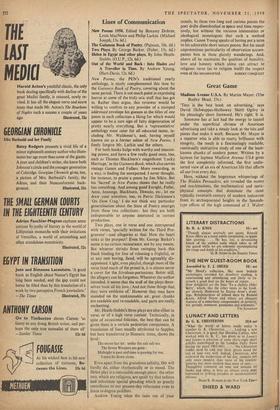Lines of Communication
Out of the World and Back : Into Hades and A Traveller in Time. By Andrew Young. (Hart-Davis, 12s. 6d.) New Poems, the PEN's traditional yearly anthology, is nicely complemented this time by the Guinness Book of Poetry, covering about the same period. There is not much point in expressing horror at some of the truly uric stuff that has got in. Rather than argue, this reviewer would be willing to confirm to any provider of a stamped addressed envelope his guesses at the titles of one poem in each collection a liking for which would appear to be a sure sign of fatty degeneration of pretty nearly everything. But a 'representative' anthology must cater for all educated tastes, in- cluding Mr. Waldemar's, and, having myself known sin as a former editor of New Poems, I freely forgive Mr. Larkin and the others.
For both books bulge with worthy and interest- ing poems, and have a few really good ones, too, such as Thomas Blackburn's magnificent 'Lucky Marriage,' in the Guinness Book, which also carries vintage Gunns and Fullers. More rewarding, in a way, is finding the unexpected. I never thought, for instance, to praise a poem by Jon Silkin. But his 'Sacred' in New Poems shows that he really has something. And among good Enright, Fuller, Amis, Jennings, Blackburn, Thwaite, etc., let me draw your attention, too, to Patric Dickinson's 'On Dow Crag.' I do not think any particular generalisation about the State of Poetry emerges from these two collections : but they are both indispensable to anyone interested in current production. • Two plays, one in verse and one interspersed with verses, 'specially written for the Third Pro- gramme'—and allegories at that. How the heart. sinks at the prospect! Even Mr. George Barker's name is no certain reassurance, not by any means. But whoever shrinks from swinging back this black binding for fear of releasing a frightful, or at any rate boring, fiend, will be agreeably. dis- appointed. Light, even playful, though most of the verse (and much of the prose) is, it is almost never a cover for the frivolous-portentous. Better still, the allegory can be forgotten. Whatever the author intended, it seems that the stuff of the plays, them- selves 'took all his love,/ And not those things that. they were emblems of.' However they may have sounded on the unskimmable air, great chunks are readable and re-readable, and parts are-really. enchanting.
Mr. Heath-Stubbs's three plays are also either in verse, or of a high verse content. Technically, in spite of occasional felicities, the best that can be given them is a certain pedestrian competence. A translation of lines usually attributed to Sappho, but here transferred to Homeric times, shows the level :
The moon has set : under the salt salt sea The Seven Weepers are gone :
Midnight is past and time is passing for me, I must lie down alone.
Even apart from the gratuitous salinity, this will hardly do, either rhythmically or in mood. The Helen play is a reasonable enough piece: the other two, which are religious, are spoilt by that tedious and inhumane special pleading which so greatly contributes to our present-day reluctance even to listen to dogma-peddlers.
Andrew Young takes the taste out of your mouth. In these two long and curious poems the poet drifts disembodied in space and time respec- tively, but without the vacuous immensities or ideological monologues that such a method implies. Canon Young speaks of having put a term to his admirable short nature poems. But his usual unpretentious particularity of observation accom- panies him in these ghostly wanderings. And, above all he maintains the 'qualities of humility; love and honesty which alone can attract to religious verse (as to religion itself) the respect














































































 Previous page
Previous page